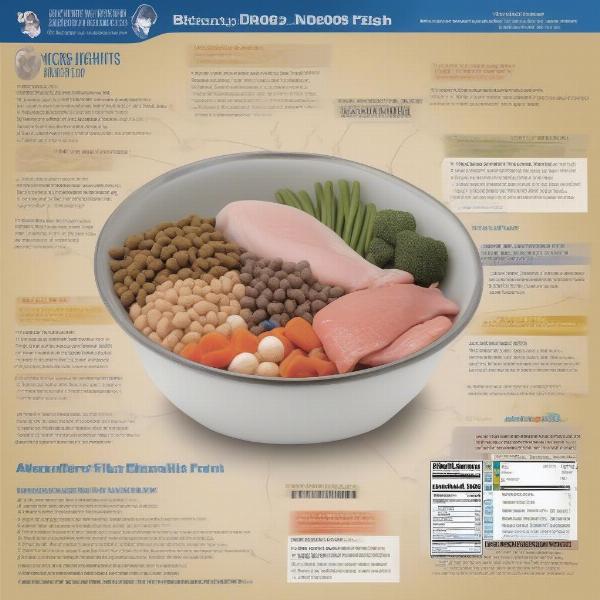Gentle giant dog food is a topic of interest for many owners of large and giant breed dogs. Choosing the right nutrition is crucial for their health and well-being. This article delves into the specific needs of these breeds and offers guidance on selecting the best gentle giant dog food for your furry companion.
Understanding the Nutritional Needs of Gentle Giants
Large and giant breeds, such as Great Danes, Mastiffs, and Saint Bernards, have unique nutritional requirements compared to smaller breeds. Their rapid growth during puppyhood, susceptibility to joint issues, and potential for digestive sensitivities necessitate careful consideration of their diet. A balanced and complete gentle giant dog food should provide optimal levels of protein, fats, carbohydrates, vitamins, and minerals to support their specific needs throughout their life stages. This includes focusing on joint health, controlled growth, and maintaining a healthy weight to prevent obesity, a common issue in large breeds.
Key Ingredients in Gentle Giant Dog Food
When choosing a gentle giant dog food, look for high-quality ingredients that provide optimal nutrition. Protein sources like chicken, lamb, fish, or beef should be the primary ingredients. Healthy fats, such as omega-3 and omega-6 fatty acids, support skin and coat health and cognitive function.
 Key Ingredients in Gentle Giant Dog Food
Key Ingredients in Gentle Giant Dog Food
Glucosamine and chondroitin are essential additions for joint support, particularly crucial for large breeds prone to hip and elbow dysplasia. Fiber, from sources like beet pulp or brown rice, promotes healthy digestion and regulates stool consistency. Avoid artificial colors, flavors, and preservatives, opting instead for natural antioxidants and vitamins.
Choosing the Right Gentle Giant Dog Food for Your Dog
Selecting the perfect gentle giant dog food can seem daunting with the vast array of options available. Consider your dog’s age, activity level, and any specific health concerns when making your decision. Puppies require a higher calorie and protein diet to support their rapid growth, while senior dogs benefit from lower-calorie formulas with added joint support.
Always consult your veterinarian before making significant dietary changes, especially if your dog has pre-existing health conditions. They can provide personalized recommendations based on your dog’s individual needs.
What should I look for in gentle giant dog food for puppies?
Puppies of giant breeds require a diet specifically formulated for their rapid growth. Look for food with controlled calcium and phosphorus levels to prevent skeletal problems.
How much gentle giant dog food should I feed my adult dog?
Feeding guidelines vary depending on the brand and your dog’s individual needs. Refer to the feeding instructions on the food packaging and adjust as needed based on your dog’s weight, activity level, and body condition.
Can I feed my senior giant breed dog regular adult dog food?
Senior dogs have different nutritional needs than adult dogs. Senior formulas typically have fewer calories and added joint support ingredients. Consult your veterinarian for personalized recommendations.
Conclusion
Choosing the right gentle giant dog food is vital for your dog’s overall health and longevity. By understanding their specific nutritional needs and considering factors like age, activity level, and any health concerns, you can make informed decisions to ensure your gentle giant thrives. Remember to consult your veterinarian for personalized advice and always prioritize high-quality ingredients for optimal nutrition.
FAQ
-
What is the best gentle giant dog food for sensitive stomachs? Look for formulas with easily digestible protein sources like lamb or fish and avoid common allergens like corn, wheat, and soy.
-
Are grain-free formulas better for gentle giant breeds? Not necessarily. Consult your vet, as some grain-free diets have been linked to heart issues in dogs.
-
How can I prevent bloat in my giant breed dog? Feed smaller, more frequent meals, avoid strenuous exercise after eating, and use elevated food bowls.
-
What are the signs of joint problems in giant breed dogs? Lameness, stiffness, difficulty getting up or down, and reluctance to exercise are common signs.
-
Is it okay to give my giant breed dog supplements? Consult your veterinarian before giving any supplements to ensure they are appropriate for your dog’s needs and won’t interact with their food.
-
Can I switch my dog’s food abruptly? No. Gradually transition to the new food over several days to avoid digestive upset.
-
How do I know if my gentle giant is getting the right nutrition? Monitor their weight, coat condition, energy levels, and stool quality. Consult your vet if you have any concerns.
About ILM Dog: ILM Dog is your go-to resource for expert advice on dog care and nutrition. We offer comprehensive guides on breed selection, health care, training, nutrition, grooming, and much more. Our mission is to provide dog owners worldwide with the information they need to ensure their canine companions live long, healthy, and happy lives. Contact us for personalized support: Email: [email protected], Phone: +44 20-3965-8624.